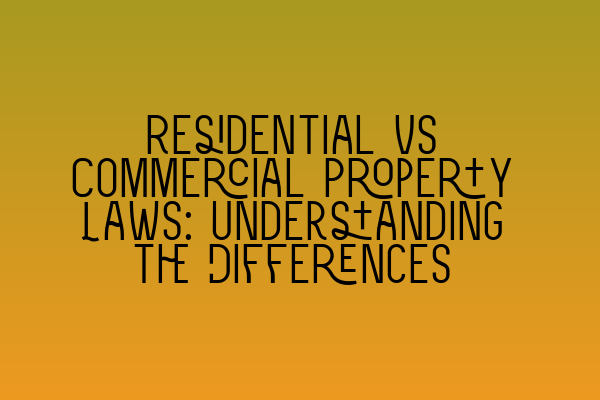Residential vs Commercial Property Laws: Understanding the Differences
If you are entering the world of property ownership or investment, it is important to have a solid understanding of the different laws that govern residential and commercial properties. While both residential and commercial properties fall within the realm of property law, they are subject to a distinct set of regulations and considerations. In this blog post, we will explore the key differences between residential and commercial property laws to help you navigate the legal landscape more effectively.
Residential Property Laws
Residential property refers to any property that is primarily used for dwelling purposes, such as houses, apartments, and condominiums. Residential properties are governed by a specific body of laws designed to protect the rights and interests of both tenants and homeowners. Here are some key aspects of residential property laws:
1. Tenancy Laws: Residential tenancy laws outline the rights and obligations of landlords and tenants. These laws cover areas such as rent control, lease agreements, security deposits, eviction processes, and the overall maintenance and safety standards for rental units.
2. Zoning and Planning Regulations: Residential properties are subject to zoning and planning regulations that determine the permissible land use, building codes, and other requirements to maintain the integrity of neighborhoods and ensure public safety. These regulations may restrict certain activities or businesses from operating within a residential area.
3. Consumer Protection Laws: Residential property laws often include consumer protection provisions to safeguard homeowners and tenants from unfair practices. These regulations may address issues like property disclosures, fair housing practices, and remedies for construction defects or landlord negligence.
4. Financing and Mortgage Laws: When purchasing a residential property, buyers must adhere to specific financing and mortgage laws. These laws govern areas such as loan disclosures, consumer rights, interest rates, and foreclosure procedures.
Commercial Property Laws
Commercial properties, on the other hand, are properties primarily used for business purposes, such as office buildings, retail spaces, and warehouses. The laws governing commercial properties aim to protect the rights and interests of business owners, investors, and landlords. Here are some fundamental elements of commercial property laws:
1. Leases and Contracts: Commercial property leases and contracts are typically more complex than residential agreements. These contracts often involve detailed negotiations concerning rent, lease terms, maintenance responsibilities, and potential business-specific requirements.
2. Land Use and Zoning Regulations: Commercial properties are subject to specific land use and zoning regulations. These regulations designate areas for different types of commercial activities and outline building codes, safety standards, and other requirements unique to commercial properties.
3. Environmental Laws: Commercial properties are more likely to be subject to environmental regulations due to potentially hazardous activities that may occur on-site or the need for proper waste disposal protocols. Compliance with environmental laws is crucial for commercial property owners and tenants.
4. Business Regulations: Commercial properties must comply with additional regulations specific to the type of business conducted within the premises. These regulations may include licensing, health and safety requirements, signage rules, and accessibility standards.
Seeking Professional Assistance
Whether you are dealing with residential or commercial property matters, it is advisable to seek professional assistance from a skilled property solicitor. A property solicitor can provide valuable guidance, ensure compliance with the relevant laws, and represent your interests in various legal processes, including negotiations, contracts, and dispute resolution.
Final Words
Understanding the differences between residential and commercial property laws is essential for property owners, investors, and tenants alike. The unique legal frameworks governing each property type require careful attention to detail and adherence to specific regulations. By familiarizing yourself with these distinctions, you can navigate the property law landscape more effectively and confidently engage in property-related ventures.
Remember, when dealing with property legal matters, it is best to consult with professionals who specialize in property law to receive accurate and tailored advice. At SQE Property Law & Land Law, our expert team of property solicitors is ready to assist you with any residential or commercial property concerns you may have. Contact us today to ensure your property transactions are handled with utmost care and expertise.
